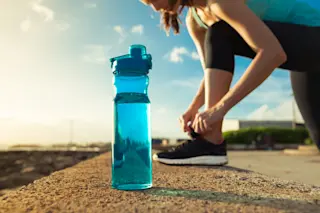Some people are very aware of their water intake. They track their sips through the ticks on the sides of their water bottles or their trips to the water cooler at work. However, some people are unaware of the water they’re drinking, and whether they’re drinking it at all. They couldn’t tell you when they took their last swig — whether it was a few hours or a few minutes ago.
Now, a team from the University of Texas at Austin has developed a new device to help those who struggle with tracking their hydration. Described in a study in PNAS, the device — which is wearable and non-invasive — assesses a wearer’s hydration levels during their day-to-day activities, both continuously and contemporaneously. The device could be used to tamp down on dehydration, a condition that can cause anything from mild thirst to severe heatstroke, especially during the hottest days ...















